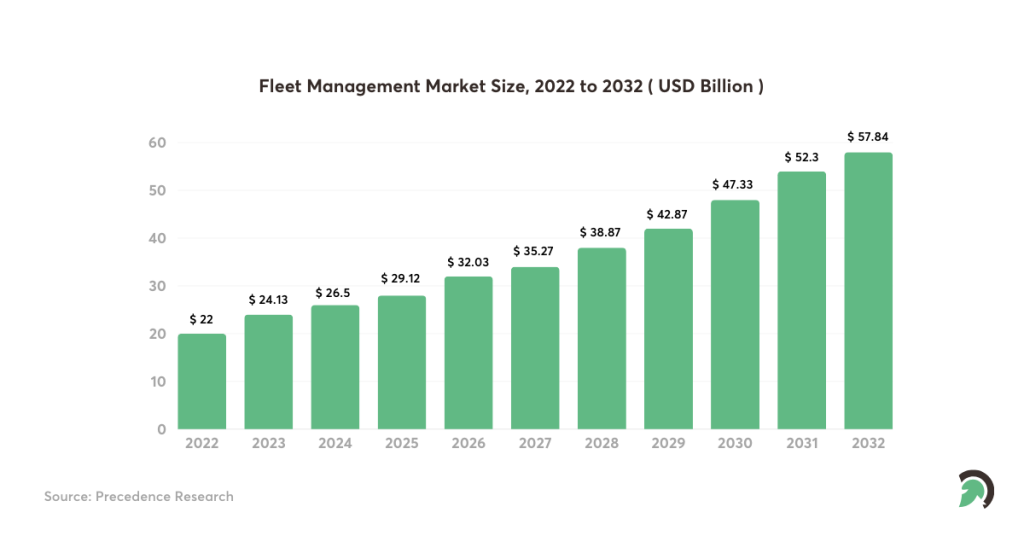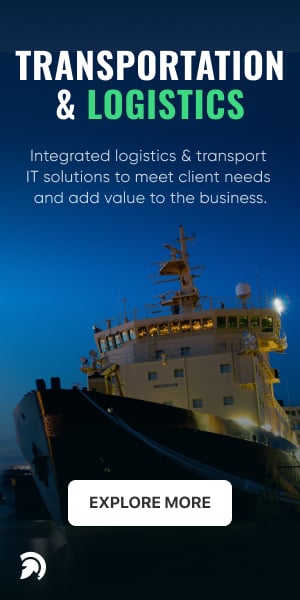In today’s fast-paced business environment, efficient management of fleets is essential to success. Whether running a logistics company, a transportation service, or a delivery business, ensuring your vehicles are well-maintained, safe, and operating at peak efficiency is crucial. That’s where fleet management software comes into play, revolutionizing how businesses manage their fleets and streamline operations.
Fleet management software is a technology-driven solution designed to help businesses manage, track, and optimize their fleet of vehicles efficiently. It comprises a range of functionalities, including vehicle tracking, maintenance scheduling, fuel management, compliance monitoring, and more. The software provides businesses with real-time insights and actionable data to enhance fleet performance, improve safety, reduce costs, and boost productivity.
Over the years, fleet management has grown significantly due to technological advancements. The software has now streamlined what once depended on manual record-keeping and unmanageable processes.
Today, businesses can use advanced tools and custom software development to gain better control over their fleets, optimize routes, monitor driver behavior, and ensure compliance with regulatory requirements.
Keep reading the detailed guide to explore fleet management software, features, challenges, and additional factors to choose the best solution for your business needs.
Key Statistics in Fleet Management To Know About
- The global fleet management market is expected to grow from $22 billion in 2022 to $57.84 billion by 2032 at a rate of 10.2%.

- According to a 2023 Frost & Sullivan report, fleet management software can improve vehicle maintenance by up to 20%.
- With fleet management solutions, 45% of fleet managers achieved positive ROI in less than 11 months.
- Since implementing fleet tracking software to monitor driver behavior, there has been a 42% reduction in safety incidents.
Challenges of Fleet Management Systems
Inefficient Route Planning
Inefficiency in route planning can cause many problems, including increased fuel costs, higher driver fatigue, and longer delivery times. Such issues are problematic for fleets with numerous vehicles or those operating in complex urban areas. There are ways to improve route planning, such as using telematics data to track vehicle location and speed and using software to optimize routes based on traffic conditions and other factors.
Poor Maintenance Management
Poor maintenance can develop problems such as vehicle breakdowns, increased fuel costs, and safety hazards. It might be complex for fleets, with many vehicles operating in harsh environments.
There are several ways to improve maintenance management, such as using telematics data to track vehicle performance and identify potential problems and using software to schedule and track maintenance tasks.
Compliance and Safety Concerns
Fleets must comply with some regulations related to vehicle safety, driver hours of service, and environmental protection. Failure to comply with essential regulations can result in fines, penalties, and criminal charges. There are many ways to improve compliance and safety, such as using telematics data to track driver behavior and vehicle performance and software to manage compliance tasks.
Lack of Data-Driven Decision-Making
Many fleet managers make decisions based on gut instinct or experience rather than data. It makes suboptimal decisions that can cost the fleet money. Several ways to improve data-driven decision-making include using telematics data to track vehicle performance and driver behavior and vehicle fleet management software to generate reports and analytics.

Limited Integration with Other Systems
Many fleet management systems need to be integrated with other systems, such as accounting software or customer relationship management (CRM) software. The process makes it complex to get a complete view of the fleet operation and to make informed decisions. To improve it, integrating with other systems, such as using APIs to connect fleet management systems to other systems and software to automate data exchange between systems, will be beneficial.
Explore Solutions for Fleet Optimization and Management
Route Optimization
It finds the most efficient route for a fleet of vehicles, which is a complex task, as there are many factors to consider, such as traffic conditions, weather, and the location of stops. Some software solutions, such as a fleet management app, can help fleet managers to optimize their routes.
The most essential benefit of route optimization is that it helps to reduce fuel costs. By finding the most efficient routes, fleet managers can ensure their vehicles use fuel wisely on necessary detours, which helps in significant savings, especially for fleets with many vehicles.
Another benefit of route optimization is to improve customer service. Fleet managers can keep customers happy and satisfied by delivering timely goods and services, which leads to repeat business and increased profits.
Proactive Maintenance
It identifies and fixes potential vehicle problems before they cause a breakdown using various methods, such as regular inspections, oil changes, and tune-ups.
The best thing is that such maintenance helps reduce downtime. By identifying and fixing potential problems early on, fleet managers can prevent their vehicles from breaking down, save time and money, and avoid costly repairs.
By keeping vehicles in good condition, fleet managers can lower the chances of accidents and improve safety by protecting drivers, passengers, and other road users.
Safety Monitoring
It is the process of tracking the safety of drivers and vehicles and can be done using various methods, such as GPS tracking, dashcams, and driver behavior monitoring systems.
The advantage of safety monitoring is that it allows accidents to be reduced. Tracking driver behavior and vehicle location allows fleet managers to identify problems and take corrective measures to prevent accidents from happening. Knowing they are being monitored, drivers drive safely, offering a safer working environment for everyone.
Analytics and Reporting
Proper analysis and reports collect and analyze data to generate insights. Fleet monitoring systems help fleet managers track various metrics, such as fuel consumption, vehicle performance, and driver behavior.
One of the most essential benefits of analytics and reporting is that fleet managers can identify improvement areas. By tracking key metrics, fleet managers can identify patterns and trends to make informed decisions for improved efficiency and profitability.
Another benefit of analytics and reporting is allowing fleet managers to communicate with stakeholders. By generating reports and dashboards, managers can share critical insights with their team members and customers to improve communication and transparency.
Seamless Integration
As many different software solutions are available, the integration is beneficial in connecting different software systems to work together seamlessly. Some integration solutions can help fleet managers connect their systems and get the most out of their data.
The integration improves efficiency, automates tasks, and eliminates manual data entry by connecting different systems, saving time and allowing fleet managers to focus on more critical tasks.
By connecting different systems, fleet managers can ensure that data is constant and up-to-date, leading to better decision-making and improved results.
Popular Types of Fleet Management Software
Fleet management comprises a range of functions to ensure the maintenance of vehicles, track their movements, manage drivers, and keep operations running efficiently. Below are different types of fleet management software:
Fuel Management Software
- The software helps monitor, control, and manage fuel consumption and purchases to improve efficiency and reduce the fleet’s costs.
- It tracks each vehicle’s fuel, identifies fuel theft or wastage, and optimizes routes to ensure fuel efficiency.
Inventory Management Software
- It focuses on managing the parts and supplies required to maintain the fleet.
- Keeps track of parts usage, manages reordering, and helps predict inventory needs based on historical data.
- The software can also help reduce the carrying costs of inventory and mitigate the risk of stockouts.

Compliance and Regulatory Software
- Ensures that the fleet and its operations comply with various regulations, including vehicle inspections, emissions, driver hours, and maintenance schedules.
- It helps maintain records that may be required for audits and inspections and automatically notify managers of upcoming compliance-related tasks.
Telematics Systems
- Such advanced systems use a GPS fleet management system and onboard diagnostics to record and report on vehicle activity, such as location, movement, status, and behavior of the vehicle or fleet.
- Telematics can aid in route planning, vehicle maintenance reminders, and driver management, providing data analytics for better decision-making.
- The system is beneficial for real-time tracking and driver safety monitoring.
Essential Features of Fleet Management Software
Fleet management software is built to help businesses that rely on transportation optimize the efficiency of their fleet operations. Here’s a detailed look into the key features that are typically found in the fleet management system:
Vehicle Tracking and GPS Integration
A fundamental feature of fleet management software that enables real-time tracking of vehicles using the fleet vehicle tracking system, providing exact locations and allowing managers to monitor routes, driving behavior, and schedule adherence. GPS data can also reroute drivers in traffic jams, accidents, or road closures, leading to increased efficiency and time savings.

Limit Distraction
Fleet management software often includes tools to limit driver distraction, ensuring safety and compliance with driving regulations. It includes turning off mobile devices while the vehicle is in motion or providing hands-free solutions that allow drivers to focus on the road while maintaining communication with dispatchers or managers.
Maintenance Scheduling and Alerts
Proper maintenance is critical to the reliability and longevity of fleet vehicles. Fleet management software or a vehicle fleet maintenance app can automate maintenance scheduling by tracking vehicle usage and service history. Alerts can be set up to inform fleet managers of upcoming maintenance needs or if a vehicle shows signs of potential issues, helping prevent breakdowns and extend vehicle life.
Put Diagnostics to Work
Modern fleet management systems can integrate with onboard diagnostics to provide real-time information on vehicle health. The data can include engine performance, emission levels, and fuel consumption. Diagnostics can help identify issues before they become major problems, saving time and money on repairs.
Tire Pressure Monitoring
Tire pressure can significantly affect vehicle performance, fuel efficiency, and safety. Fleet management software may include tire pressure monitoring systems that alert the driver and fleet manager if the pressure in any tire falls below a certain threshold, allowing for prompt action to be taken.
Streamline Dispatching
Efficient dispatching is vital for on-time deliveries and service. Fleet management software helps to streamline the process by providing dispatchers with tools to assign jobs based on proximity, vehicle availability, and driver skill set. It provides estimated arrival times to customers.
Put Fleet Safety First
Prioritizing fleet safety is crucial, and fleet management software often has features supporting goals such as monitoring driver behavior, speed, harsh braking, and rapid acceleration. It also covers incident reporting tools, safety training modules, and the ability to track compliance with safety regulations.

Capitalize on Insightful Reports
Data is a powerful tool for fleet optimization, and the software can generate many reports. Some reports can analyze everything from fuel efficiency and idle time to overall fleet performance and individual driver behavior. Insights from such reports can guide business decisions, leading to cost savings and improved operations.
Driving Success: How Companies Are Thriving with Effective Fleet Management
UPS
UPS also uses fleet management systems to optimize package sorting processes within its distribution centers, track driver behavior, and provide feedback. By efficiently managing its internal logistics operations, the system helped reduce accidents by 38% and saved the company $38 million in fuel costs. As a result, UPS can enhance productivity, reduce handling times, and improve overall service quality.
Coca-Cola
As a global beverage company, Coca-Cola operates a large fleet of vehicles for distribution purposes. By implementing fleet management software, Coca-Cola can efficiently manage its fleet operations, including vehicle maintenance scheduling, route optimization, and driver performance monitoring.
It enables Coca-Cola to streamline its distribution processes, reduce delivery times, and enhance operational efficiency. The company decreased fuel expenses by 5-10% while enhancing driver safety.
The real-time tracking capabilities provided by the software allow Coca-Cola to respond promptly to any issues or delays, ensuring smooth operations throughout its supply chain.
City of Stamford
Managing a fleet of 1,100 vehicles, Stamford recognized inefficiencies in its 80 passenger vehicles. Implementing Fleet Management software and vehicle sharing policies led to a streamlined operation, reducing the fleet to a smaller 49-vehicle motor pool. The software, with advanced features including online reservations and automated dispatching, facilitated such transition. Further optimization resulted in a motor pool of just 29 vehicles.
Selling the surplus 51 vehicles yielded ongoing savings of $356,000 in two years, with projected 5-year savings of over $1 million.
Choose EvinceDev to Build a Custom Fleet Management Software Solution
Fleet management software is crucial in optimizing the efficiency, safety, and compliance of fleet operations for businesses of all sizes. Utilizing advanced technologies and comprehensive features allows fleet managers to make data-driven decisions, reduce costs, enhance productivity, and deliver superior customer service.
When implementing fleet management software, it’s essential to carefully assess your business needs, select the right solution, and continually refine your processes to achieve maximum results. With the appropriate software and approach, businesses can make the most out of fleet operations and stay competitive in today’s dynamic marketplace.
For businesses seeking to improve their fleet operations, choosing EvinceDev, a leading software development company, to build custom fleet management software is a strategic move towards future-proofing their fleet, optimizing performance, and achieving their business objectives.
If you need assistance regarding the best-tailored software for your specific needs, contact us for a FREE consultation and explore customized IT consulting services.




